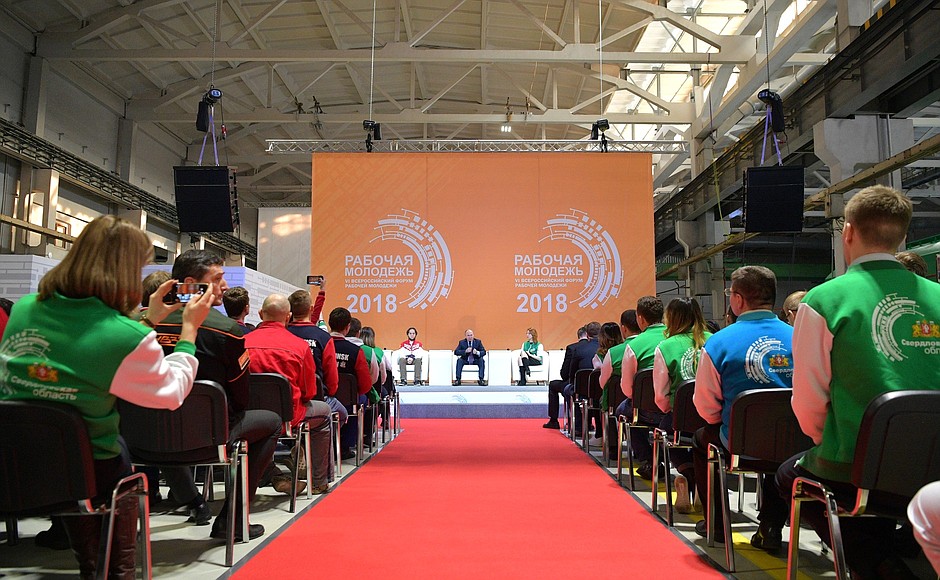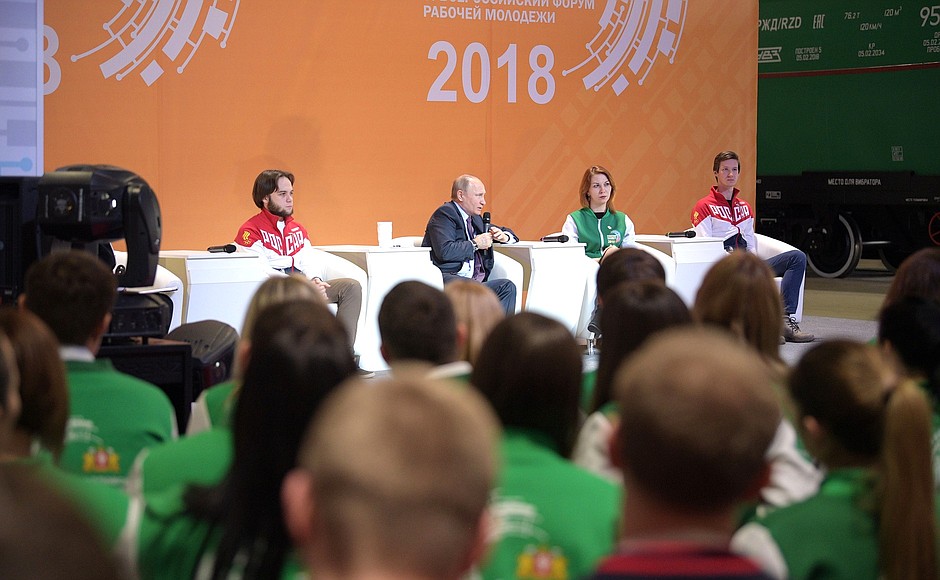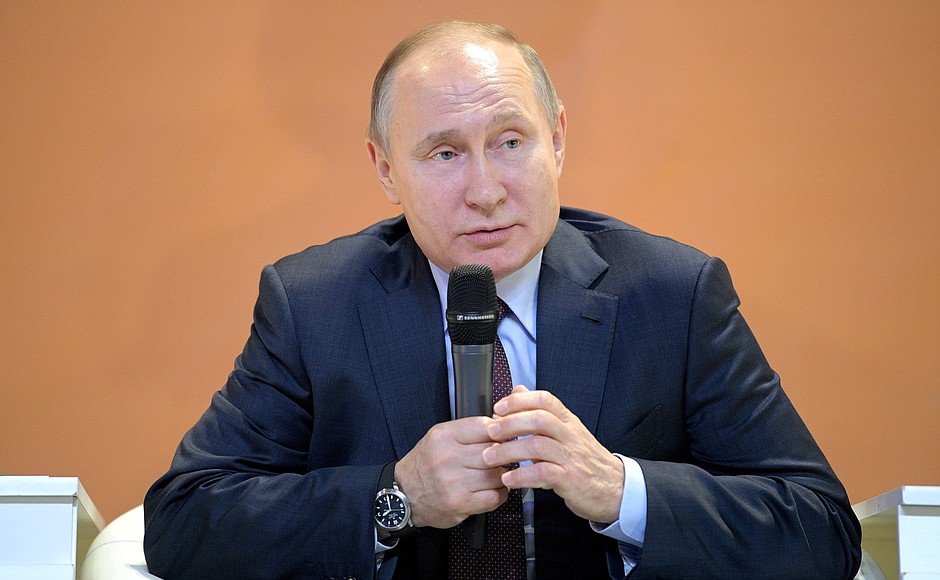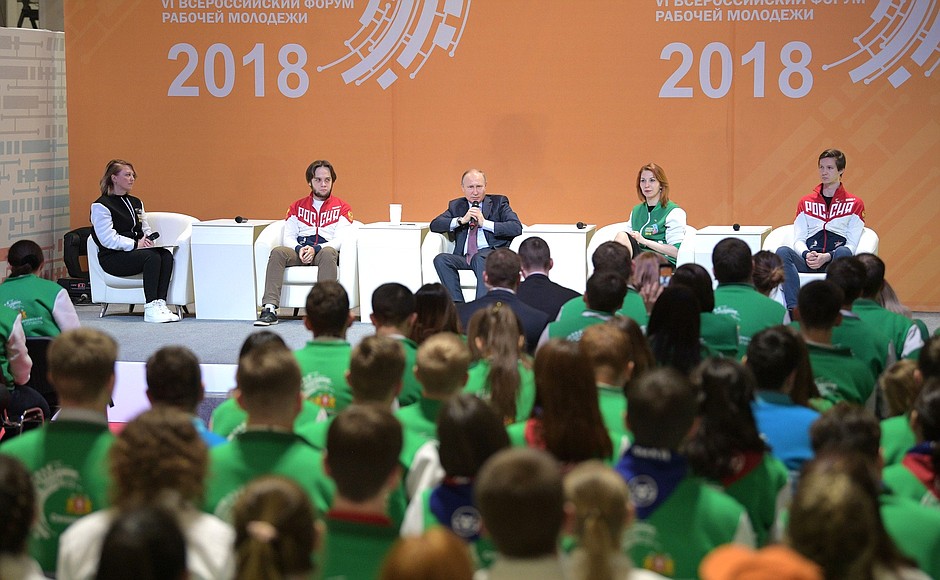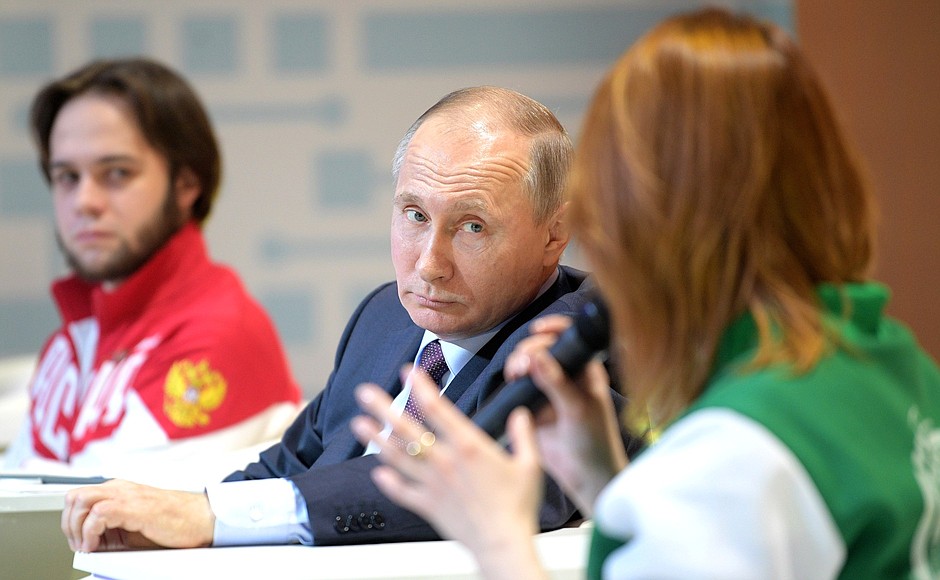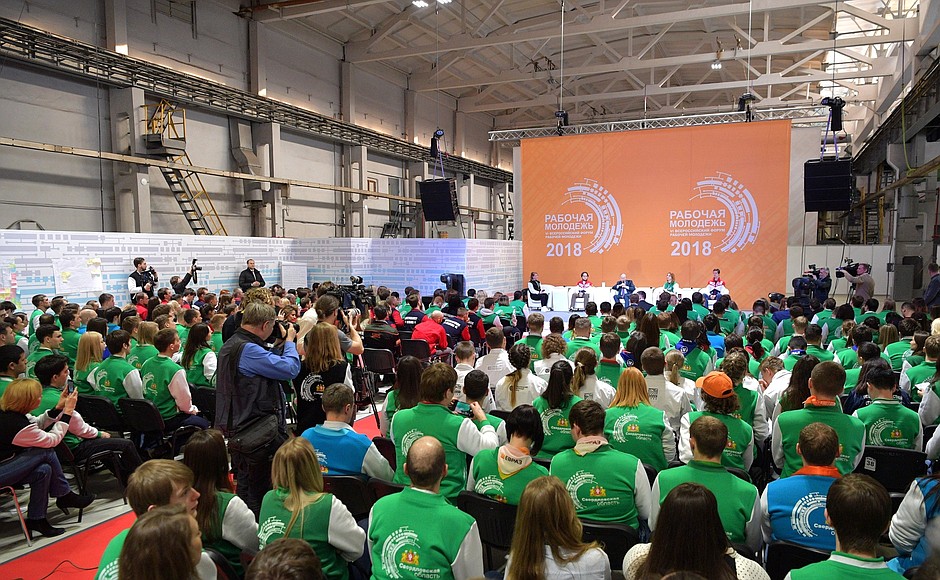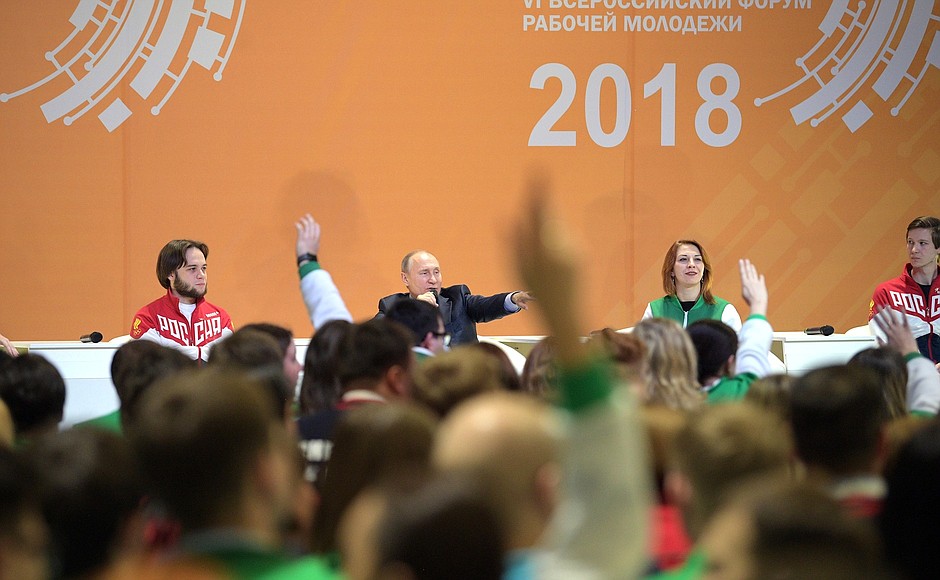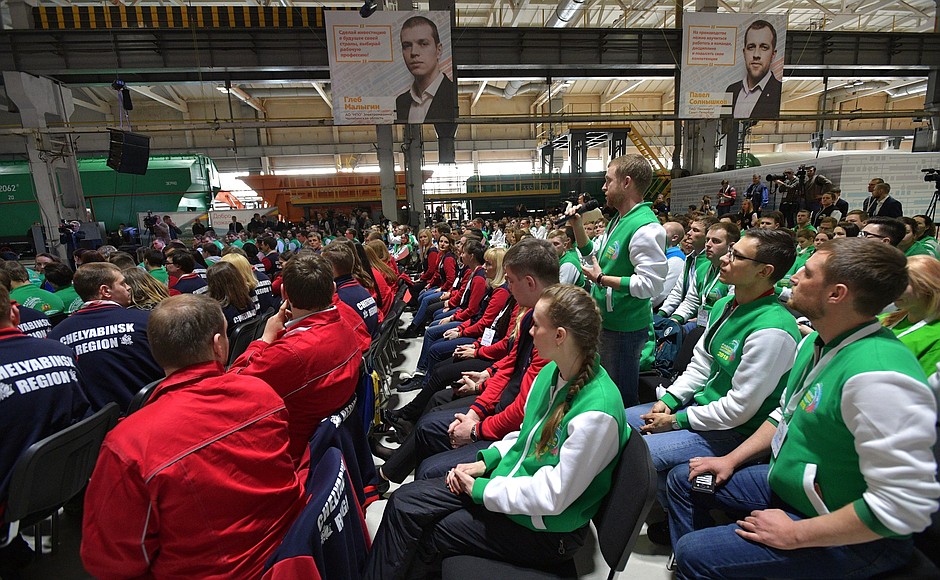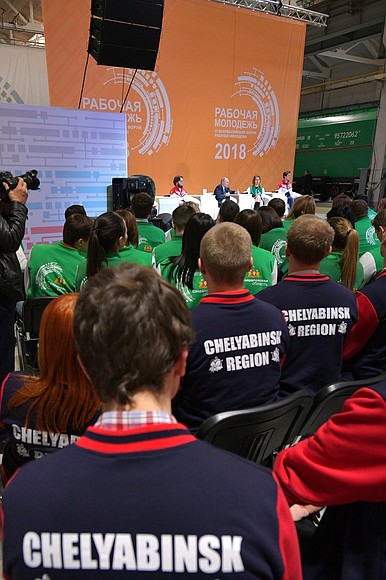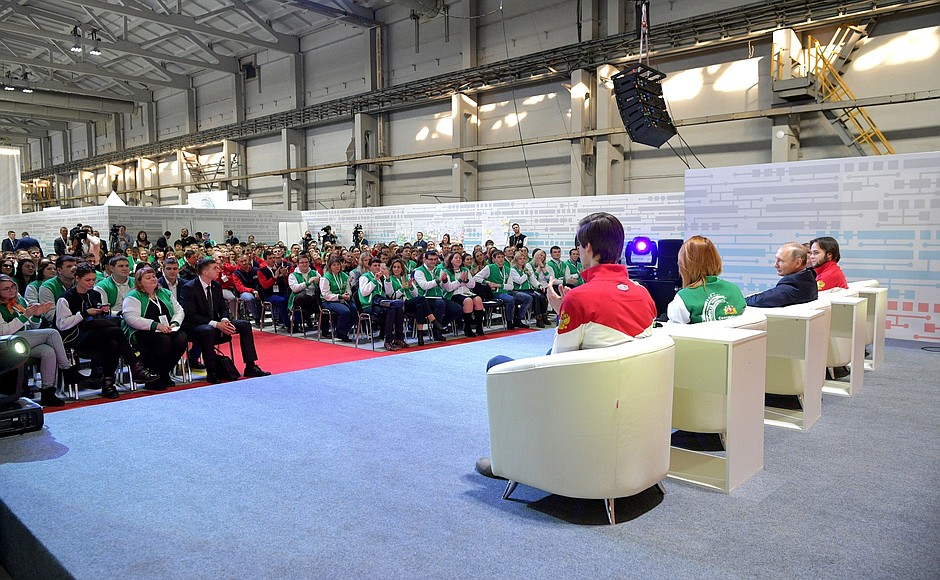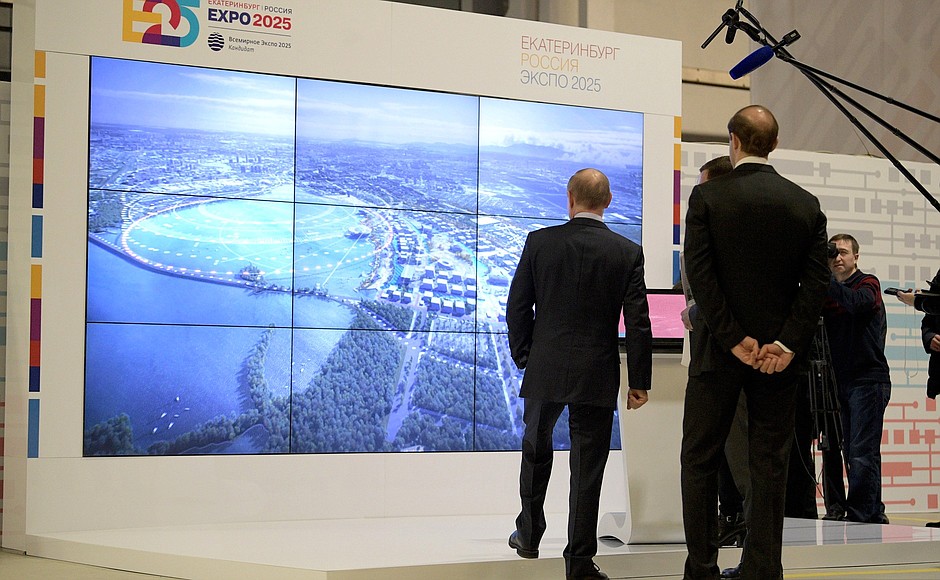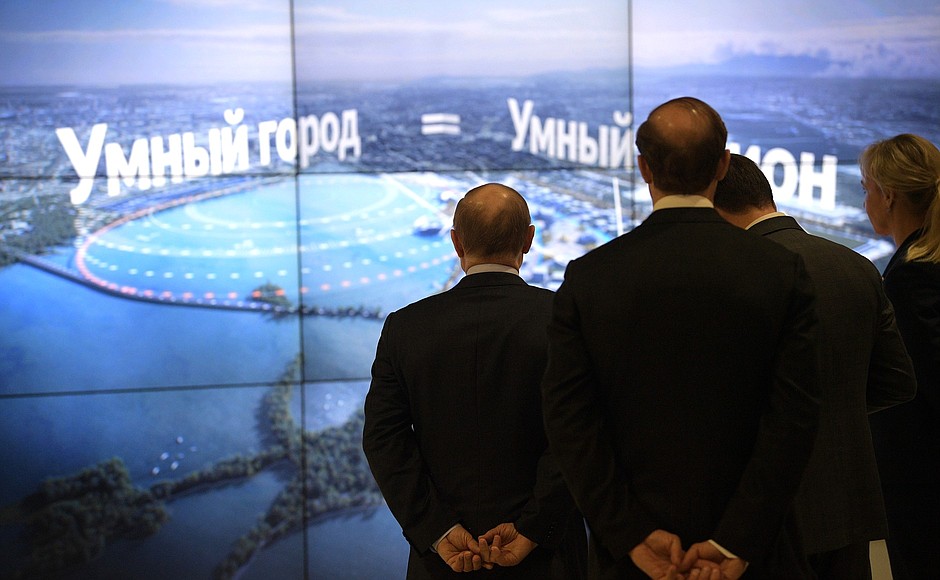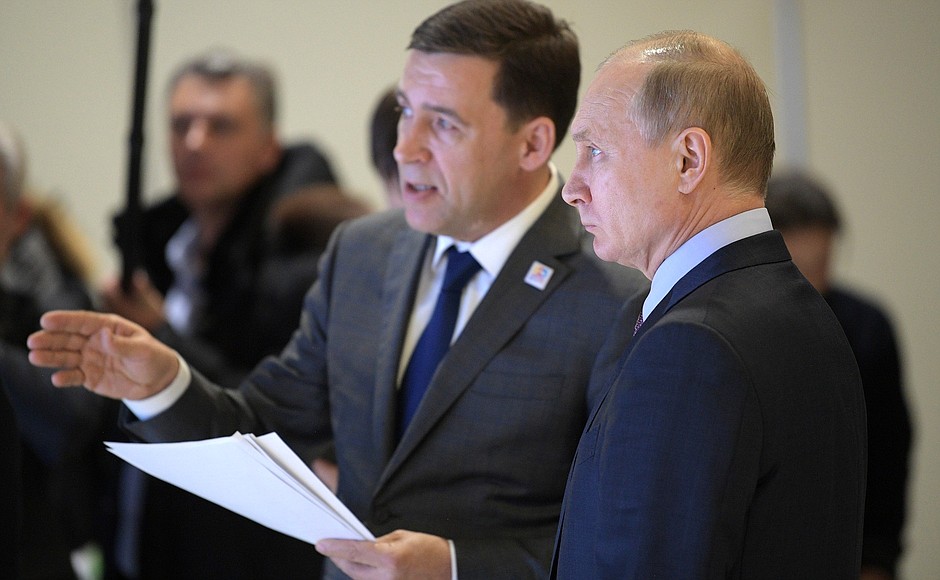Vladimir Putin acquainted himself with the infrastructure preparation project that forms part of Yekaterinburg’s bid to host the Expo 2025 international exhibition, a presentation on which followed the President’s participation in the Russian Working Youth Forum held at Uralvagonzavod.
The Smart City legacy concept for Expo 2025 was displayed for the President on a multimedia screen. In particular, Vladimir Putin was shown the first designs for pavilions at the future exhibition and the circular monorail to be built above the water near the Expo venue, as well as other plans for improving the space. The head of state wished Yekaterinburg luck in its bid to host the exhibition.
The goal of the sixth Russian Working Youth Forum held in Nizhny Tagil on March 4–7 is to increase the popularity of blue-collar jobs. More than 300 young people are taking part in the conference, including representatives of industrial, transport and agrarian companies, and leaders of youth professional communities.
Earlier in the day, the head of state visited Research and Production Corporation Uralvagonzavod, where he was shown around a rolling stock production line and talked to the plant’s personnel.
* * *
President of Russia Vladimir Putin: Good afternoon, friends.
I am very happy to be here with you and to greet you at your forum. This forum is known to be a success; it provokes a lot of interest among the participants and those who would like to participate.
It is clear why: we have many times said that our economy, which is undergoing modernisation and securing new positions, is related to new technology and needs new specialists, first of all, engineering specialists.
I have already said this in public many times: this is about blue-collar professions, about engineering training at universities. I have also spoken about blue-collar professions: we need specialists with engineering training to implement the decisions we made on the applied Bachelor degree programme.
We need people who understand what modern production is and how it works. We need people who know what programming and robotics are. This is a complex area, but without it, without all this knowledge and skills, we will not be able to solve the serious issues our county is facing.
You may have noted that I spoke about it in my Address to the Federal Assembly, both in the civilian and military parts. In the civilian part, I spoke a lot about that, from different points of view, but mostly about training for blue-collar professions in different spheres.
Speaking about defence, I said directly – maybe some of you heard it – that all the advanced kinds of weapons we have developed are becoming operational. This is the result of the work our scientists, designers and engineers have done.
You may also have taken notice that I spoke about talented workers who enjoy what they do, who work steadily and effectively year after year, without advertising themselves, but in earnest, and who achieve outstanding results. If there were no such people, we would not have any results.
I would like to say once again something that I spoke about just recently, in Kaliningrad I think, at the meeting with regional journalists. When the work on one system was over, I asked the chief engineer to show me the list of people who should receive awards for their achievements. After some time, he did. But what a list it was! It surprised me. Three or four sheets of paper were covered in small print with names of enterprises. When I asked him “What is this you brought?” he said, “If we crossed out even one of them, we would not have had the product.”
This very demanding and complex joint work was a real discovery even for me, a man who has been working on it maybe not every day, but every week for many years. To tell the truth, I was a little shocked. Even I was impressed with how deeply and powerfully this work has been organised.
And one more point straight away: we could not have done it without the people. These were not just the enterprises: each name had tens of thousands of workers behind them. In many cases, the people did not even know what they would get in the end, after the final assembly, but every individual had their own place and a clear understanding of what they had to do well, and they did it.
This is how things must be in any sector, whether military or civilian. In addition, this must be done in a natural symbiosis like at the enterprise where we are meeting today, Uralvagonzavod. This is an iconic company, established in the 1930s as a defence enterprise, but later (it can be clearly seen today) the civilian part gradually became more important and now covers more than 40 percent of production.
I would like to say that this compatibility is very important for the civilian as well as for the military part. They feed each other, providing additional financing from state sources as well as access to global markets for their products, including civilian products. But nothing has ever happened or will happen, anywhere and anytime, without each person doing his or her work competently.
By the way, during all our periods of rapid development –I mean our country, Russia – these revolutionary transformations in the country and its economy always came, and maybe even began, with the training of workers.
This was the case under Peter the Great, when at his initiative, specialised schools were created for [marine] navigation, artillery, medicine, and other fields. As it happens, here in the Ural region, special mining schools were started at mining companies at the order of Peter the Great.
Later, in the late 19th century, the same thing happened in Russia again, when the country’s rapid development and industrialisation began on a new foundation, and the same thing occurred with training workers. It happened again in the 1920s-1930s.
Now we are going through this stage of development again. As I have already mentioned – and I will end my monologue on this point – we need people with fresh knowledge and new approaches – people who are ready for a challenge and who want in their heart and soul to meet that challenge, and sincerely strive to do so – in order to guarantee that the results we seek will be achieved.
Thank you very much.
That concludes my monologue. Thank you very much.
Yekaterina Dragunova: Thank you very much, Mr President.
Our boys and girls now have a unique opportunity to speak with you and to ask any questions, if possible.
Svetlana who is sitting here on this stage chairs the youth organisation at Uralvagonzavod. This rather large organisation unites 17,000 young people. All right, Svetlana, you run the show and ask your first question.
Svetlana Aldushina: Good afternoon, Mr President.
First of all, I would like to thank you on behalf of all forum participants for finding time to come here and to attend the 6th Russian Working Youth Forum.
Vladimir Putin: Thank you.
Svetlana Aldushina: I am particularly happy about the fact that Uralvagonzavod and the city of Nizhny Tagil are hosting this forum. On behalf of city residents, I would like to thank you separately for recently signing an executive order on celebrating the 300th anniversary of Nizhny Tagil in 2022. We have already started preparing for this event.
And here is my question. Mr President, the following situation has taken shape in Russia: Universities are being expanded, while the number of their branches continues to decrease. As a result, Nizhny Tagil is losing an opportunity to train young specialists here in this city, without sending young people to other cities from where they don’t always come back. Might it be possible to consider retaining three to four universities in Nizhny Tagil or in the region’s second-largest or third-largest cities, so that young people would be able to earn degrees in various fields here?
Vladimir Putin: It appears that you take this issue quite seriously. Your colleagues asked me exactly the same question when I was speaking with them. I answered, but I am happy to repeat what I just said.
What is the problem? The problem is that since 1991, due the introduction of paid education services, the number of higher education institutions has dramatically grown in our country – if I am not mistaken, between 1991 and 2012, the number of universities and branches has almost doubled. And, unfortunately, the quality of training in these institutions left much to be desired. Many of them just turned into rubber stamps for diplomas. But such specialists, who buy their diplomas, are not in demand. This led to problems. A person graduates from a higher education institution or a branch of even a respected university, starts working and can do nothing, so he or she must be re-trained. There is no use for such specialists. The percentage of those not working in the field they were trained in was enormous. That is why we launched that soft reform, as it was called. And the number of higher education institutions has decreased by more than 30 percent, and the number of branches has fallen by more than 60 percent.
Of course, I perfectly understand that such cities as Nizhny Tagil require their own base. By the way, you spoke about several universities. Five branches of universities in Tagil are still working, they have not been closed. This is the first thing.
Second. When branches are closed, representatives of local authorities take part in this, or they are supposed to, and they should influence the final decision.
Third. The decision itself is made not by the state, but by the university, by the higher education institution itself. And therefore, there are two possibilities: either close or improve the branch network. But, of course, sometimes, probably, they have to close, and they often close. But in Nizhny Tagil, there is a need to train some professionals on-site. Of course, it is better not to close them then. But this issue needs to be worked out with the university itself and with the region. We will discuss this issue with the governor, and when I return to Moscow, I will also talk with the Minister of Education on this matter.
And, finally, the most important thing. You said that many people do not return. It is necessary to create conditions for people to return to their native regions: increase wages, solve housing problems and offer leisure opportunities. We were just discussing how you have built a good sports and recreation centre here, a stadium, but now they say that it would be nice to have a track and field arena. This is just a specific example, though. We will do this, we will build an arena here in Nizhny Tagil, but I do not mean only in Nizhny Tagil, but in general in such industrial centres where it is necessary to solve these tasks, and then people will return. We must all work on this.
Yekaterina Dragunova: Thank you very much.
Ok, let’s get to the questions from the audience. Please introduce yourself so that we know who you are.
Kristina Shchogol: Hello, my name is Kristina Shchogol. I represent the Avangard company in the city of Safonovo, Smolensk Region. I work in career guidance.
Vladimir Putin: In what?
Kristina Shchogol: Career guidance. The world today is changing so fast that young people have to adapt fast and be flexible, learn about as many new technologies and related areas as possible. How much do you think this also applies to industrial workers and manufacturers? Or perhaps our professionals should focus on one specific area of expertise? Thank you.
Vladimir Putin: Of course, anyone would be pleased to know (and I think it is very important) that he or she is a real expert in something rather than someone who has just superficial knowledge. Unfortunately, today it is not enough anymore.
Those who can work across different areas of knowledge and skills have a strong competitive advantage. It is very important that a person understands what he is doing. Some machines and equipment are very complex but if a person knows about programming, understands robotics and artificial intelligence, if he is even aware of these things, his work gets easier. His work will surely be more effective, it is obvious. Therefore, considering that production and the economy are going digital, there is artificial intelligence, robots and so forth, it is really useful for workers to have this knowledge. This is the first.
Second. This creates a more flexible labour market and a person with this knowledge can, if necessary, when production techniques advance and new jobs emerge, easily find his place. So yes, one should be an expert with in-depth knowledge and excellent skills but work in related areas and jobs (another very important issue, we might yet discuss it) and ability to work in a team are extremely important. They are already in demand and will be way more in demand very soon. I have no doubt about this, not for a second.
Andrei Korsakov: Hello. My name is Andrei Korsakov, Irkutsk, Irkutsk Aviation Plant – Irkut Corporation. I am a mechatronics engineer, specialising in additive technologies.
Our workers closely follow the WorldSkills competition. Of course, we cheer for our representatives, for our professionals and are very proud when they take prizes at both the regional and national levels. And we would like the WorldSkills format to have more mass formats, mass standards for professional qualifications.
Vladimir Putin: This is exactly what is happening
First of all, I fully agree with you. We joined this movement only in 2012. In 2013, we took the 33rd place out of 47 teams and came in last in the medal standings, if I am not mistaken. And last year (or the year before), we came in first. And of course, it was very gratifying to realise that we were capable of such astounding progress.
And, second, it is extremely important that we really achieve results. This is the most important thing. And it is a great pleasure to look at our boys and girls standing on the podium and taking first place. I think it is a pleasure for everyone. It causes a feeling of pride, respect both for those who achieve such results, and for the country that produced them. But this does not mean that we should focus only on major international events of this kind. No, we now hold regional and even industry-wide and enterprise-wide competitions of this kind. I am not sure but I think here, in Nizhny Tagil, up to 400 events and competitions of this kind are held. If I am not mistaken, 400 events were held in Nizhny Tagil, or in the region last year. In any case, in the region. Hundreds. And we will continue to develop this further without a doubt.
Andrei Korsakov: Thank you.
Anna Chukavina: Good afternoon,
I am Anna Chukavina from Izhevsk, Udmurt Republic. I work as design engineer at Kupol electromechanical plant in Izhevsk.
Here is my question. Professions are traditionally divided into men’s and women’s jobs. Nowadays girls are increasingly choosing men’s jobs and are starting to work as engineers, welders and mechanics. Meanwhile, men feel comfortable with women’s jobs, becoming the best chefs or hairstylists. What do you think of that? Thank you.
Vladimir Putin: What do you think? (Laughter in the audience.)
Anna Chukavina: I am OK with that. I feel very comfortable about my job.
Vladimir Putin: So do I. (Applause.)
Look, firstly, there is a stereotype in public consciousness that there are men’s jobs and women’s jobs. It is just a stereotype. And there is hardly any substance behind it as there is behind any stereotype. You mentioned chefs. My grandfather was a cook whereas my father was a foreman at a factory. By the way, at the Yegorov Railcar Works in Leningrad and St Petersburg, the railcar works is practically there now. Both my grandfather and father were quite happy with their lives and were proud of their occupations. Of course, there are and should be certain restrictions. Meanwhile, it used to be in our country that women were, say railway workers, drove in spikes, brandished heavy hammers. And it was no problem. Whereas during the Great Patriotic War women worked in all men’s jobs, and they fought, actually, like men too.
However, modern production conditions are just expanding those opportunities, primarily for women. What was very difficult yesterday, physically hard, is becoming absolutely accessible today thanks to modern equipment and modern knowledge, and women show their worth there very effectively.
We have just spoken, and a colleague asked about WorldSkills and similar contests. Our girls won first place in IT and other technical disciplines while the boys were also among the winners in the jobs you just mentioned. So you know, I think the key is that you love what you do. If you love what you do, you will achieve the result, and this is what is ultimately most important.
Dmitry Krotov: Hello, Mr President!
My name is Dmitry Krotov. I represent the Chuvash Republic, the city of Novocheboksarsk, Khimprom. I work there as an engineer on the maintenance and installation of electrical equipment.
Our world is constantly changing, new technologies are being developed and introduced, and automation in the workplace is a reality. But do you think that one day I might come to work and see a smart, fast robot doing my job – do you doubt that this trend will lead to the loss of my job in the labour market?
Vladimir Putin: This threat does exist. Such a threat has always existed throughout history with new technology changes and new technological revolutions. Remember the technological revolution in Europe, what it degenerated into in the UK, for example, when new equipment was broken up by the workers, and so on.
But we live in the 21st century, and we understand what can happen. And to avoid certain negative trends, we have to consider how we will respond to this situation. Of course, things will change with new technology, robotics, using artificial intelligence, using the achievements that appear in medicine and genetics. Labour efficiency will drastically increase, I hope. By the way, in this regard, wages should also increase, new modern, well-paid jobs should emerge, high-tech and more attractive to people.
But there are several ways to approach this problem. First, timely retraining, that is what we are talking about here – an opportunity for soft retraining. First.
Second. Training should be constant in the modern world, in a developed economy. You probably see and understand this. That is, you need to do this all the time to avoid a situation where a robot can replace you.
First, you will know in advance if a machine can replace you, what machine, what it will do, how it will replace you, and where your place is among the machines. But in the end, everything is done by people. Even when you consider arguments about what will happen with artificial intelligence, whether it will be better than the human brain, whether it will replace us and create a threat to us – there are different points of view on this. They say that if a machine counts several times better and faster than a person, it will start to somehow betray a person. But there are pessimists, and there are optimists who say that in the end the creative nature of the human being will always have an advantage over artificial intelligence. But this is quite a distant prospect. Although everything is developing very quickly and knowing about these problems, we have every opportunity to avoid these obstacles and, conversely, use everything that modern science gives us for the benefit of our development.
Pavel Andreyev: Good afternoon! Pavel Andreyev from Nizhny Novgorod in the Nizhny Novgorod Region. Teploenergo company, a member of the Youth Chamber at the City Duma.
Mr President, I really love my job and I am doing what I really like. For me it is important to not just do my duties well, but to feel involved in a common cause. We created our youth council at the company, which, by the way, was recognised as the best youth council in our region in 2017. We exchange knowledge, experience, cooperate on projects and help each other. And I would like to involve others from other companies and other cities in this interaction. Please support this initiative.
Vladimir Putin: The initiative is good of course, and I will gladly support it. It is necessary to understand what needs to be done. But you can develop it yourself today with modern technology, with the internet. Of course, you need good and fast internet. But there are opportunities today. You need to involve your leaders, trade union organisations. Strictly speaking, you created this council yourself, and, as you say, it works well. But communities like this can be created on the internet, and it would be a natural movement, a grassroots movement. But as for support from above, I will try to provide it, with pleasure.
Do you know what else I would like? I would like you to join the programme that I talked about in the address – the Ticket to the Future programme for high school students. We even envisioned a billion for it this year, so they can learn about the opportunities of future professions, to begin the so-called process of early career guidance. Find out if it is possible to cooperate with schools. And it is not necessary to go far, this would be interesting. And, more important, it would be very useful.
What is the name of your company?
Pavel Andreyev: Teploenergo.
Vladimir Putin: We will see what can be done to promote it from above. Alright?
Pavel Andreyev: Thank you.
Vladimir Putin: Thank you very much.
Yekaterina Dragunova: Mr President, thank you for visiting our forum and for your sincere answers.
Vladimir Putin: We can take a few more questions.
Yekaterina Dragunova: Very good.
Gulnara Khamiyeva: Good afternoon, Mr President.
My name is Gulnara Khamiyeva, I represent the Republic of Bashkortostan.
In the forum’s mentorship track we talked about how Russia needs a new law on mentorship to comprehensively regulate this area including both financial and non-financial incentives.
I would like to know your opinion on this and also learn who were your mentor as you climbed your career ladder? Are you a mentor now, and if so, what is your incentive? What incentive do mentors need for this practice to develop in our country?
Thank you.
Vladimir Putin: Your question about my mentors is a difficult one. I’ve had them, and they were very wise, competent and decent people. I’ve never thought about it, but now that I recall them I have to say I’m grateful. Even though some of them were not my mentors officially, I learned from them nonetheless, and it is with a feeling of respect that I remember them.
Mentorship is a very good movement. It is essential that it be sincere, for experience and the attitude towards work to be passed from heart to heart, so to speak. It is very important and actually unique when it happens that way.
Of course, the state needs to step in to make sure everything is properly organised. You may have noticed that I met with the winners of the mentorship contest. They are great people, by the way, and some of them are young. Do we need a law? Yes, it is possible, so let’s work it through. Thank you for mentioning this, we will think about it. I think a law would be a good sign of support from the state.
I will talk to the State Duma deputies and officials in my administration. I think a law is possible. In any case, we won’t fail to support this movement, but a law is possible, too.
I see a hand raised over there. Please pass the microphone to whomever you see.
Regina Adizova: Hello, Mr President.
My name is Regina Adizova, I am training under the ChelPipe corporate educational programme, The Future of White Metallurgy. I have the following question for you.
Vladimir Putin: Great. You have such an interesting production system. The first time I went there, I was really surprised. I did not expect it, I did not know that we had this kind of production. I mean I knew about it in theory, but when I saw it myself… it makes an impression. As if I was at a clinic, with everyone in white coats. Sorry for interrupting you.
Regina Adizova: Please tell me, what is the main direction in Russia now, and where is there a lack of specialists?
Vladimir Putin: We have many main directions; I have talked about them many times: digitalising the economy, robotics, artificial intelligence, everything that is related to biology, medicine and genetics. Why such diversity? We are all different. But a variety of important directions for the country's development gives each of us a chance to find ourselves. I hope that you will succeed, too.
Anastasia Morozova: Hello! My name is Anastasia Morozova, Yekaterinburg.
Despite the fact that, perhaps, I am not directly connected with the technical professions, I have a strong feeling for them, really, because I teach speech in the Russian Trade Union of Industry, which includes over 1.5 million people.
Vladimir Putin: So you teach trade unionists how to speak eloquently, do you?
Anastasia Morozova: No, I teach them communication skills so they can be helpful and convey the information they need to.
Vladimir Putin: This is important.
Anastasia Morozova: I would like to thank you on behalf of all trade union leaders for raising the minimum wage to the subsistence minimum. Thank you from all working people. Of course, this will help increase the income of the population. Thank you very much!
And I have a very important question that concerns many people here. I have worked up all my courage to ask you this.
Tell me, please, what tools can improve the effectiveness of the dialogue between employees and management and authority? Perhaps, this can be done through the leaders of the trade union, through lawyers. But maybe there are still some tools that we have overlooked (but this is important)?
Vladimir Putin: As for the minimum wage, it took a lot of time to adopt the decision, as economic conditions did not allow us to resolve the issue completely. As for the trade unions, they made a very significant, appreciable contribution to this. Moreover, the head of our main leading trade union association, Mikhail Shmakov, proposed moving the deadline for the adoption of this decision up, when we met with him. And we agreed that it would be on May 1 of this year, on Labour Day.
This can improve the well-being of around 4 million people. However, as I said in the Address, it is not enough. This decision is not the final solution to the key issue of reducing the number of people living in poverty. We need to address this issue in a more comprehensive way to halve the number of people living below the poverty line, including people who are employed, which is absolutely unacceptable.
How can we improve the dialogue between employers, public officials and employees? We have a legally defined procedure that we use effectively. I am talking about three-party commissions and related agreements. One such document was recently signed in cooperation with the trade unions. The agreements may cover industries, regions, etc. I would call this a general approach. However, trade unions need to address this issue first and foremost in their day-to-day work. It is their purpose and mission – to protect the rights of the worker, in the broadest sense, not to limit themselves to simply calling for a salary increase or other benefits.
What is most important for trade unions is to have competent, economically trained staff who have expertise in today’s economy, a given plant, or the place they work, so they can build on this knowledge to raise the issues of improving labour conditions, increasing salaries, and solving social issues. If carried out in a professional way, these efforts can produce a decent result, fulfilling the mission of the trade union.
What you do is really important. There are other approaches, however. Political parties, public organisations, broadly speaking, and the media should contribute to this issue. What they should be doing in modern society is boosting the economy in order to reach the key goal of improving living standards for the people of Russia.
Friends, don’t be mad at me – I understand that all the issues are very important and interesting, and that we could spend a lot of time discussing them. But I must be on my way to the next item on my agenda. I have a meeting on a related subject – professional training in middle management. The meeting is in Yekaterinburg, where our colleagues are already waiting.
I wish you luck and success, and I thank you for your interested and pro-active stance. This alone gives you an edge. It proves, too, that your internal “nuclear reactor” is working.
I wish you good luck. Thank you very much.
